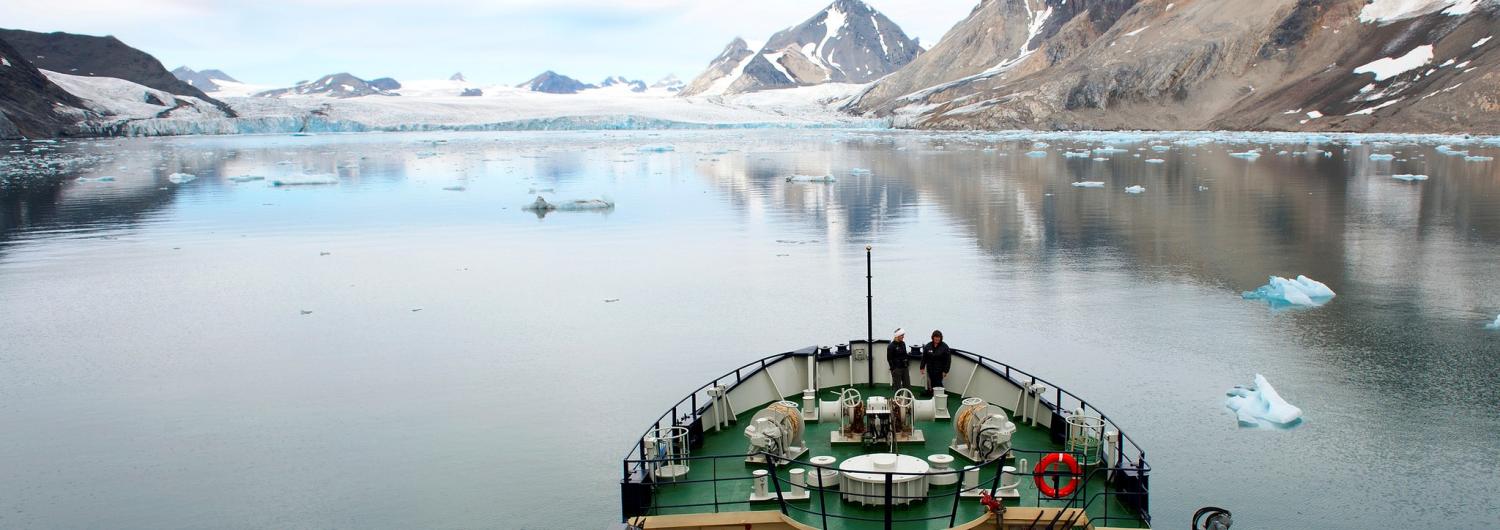A more open Arctic could transform international trade, but early signs of strategic competition suggest the region could also be the next frontier of instability. A proactive state such as Australia should intervene now to encourage the establishment of positive norms and agreements before circumstances deteriorate to a point where diplomacy becomes less effective.
Three factors have been changing the character of the Arctic region and are set to make its waters a contested thoroughfare and its geological riches coveted assets. Firstly, warmer climactic conditions have reduced the intensity and spread of polar ice, presenting more open sea, more often throughout the year. Secondly, the commercialisation of more durable ice-breakers has made traversing the Arctic’s waterways more practical. And thirdly, the development of more sophisticated deep-sea drilling technologies has made exploiting the Arctic's natural resources more viable for nations and businesses alike. Together, these factors mean the Arctic is very quickly heading toward a period of intense strategic competition.
Many nations stand to benefit from the opening of new trans-Arctic sea lines between Europe and North Asia as these routes would be a shorter alternative to longer established corridors. For those states, including Australia, whose seaborne trade currently passes through the Indo-Pacific gateway of the Malacca Strait, an additional Arctic route may reduce the impact on commerce of any security crisis along the Malay Archipelago. Yet the benefits of a more open Arctic are not a fait accompli. Circumpolar states are eager to exploit the Arctic's rich reserves of oil and gas and, with competing claims of sovereignty already apparent, it is very likely that the Arctic will be the next great test of the UN Convention on the Law of the Sea (UNCLOS). Ensuring that the Arctic remains a peaceful region and an enabler of international prosperity will require deft diplomacy. For this the UN will have a role, but smaller regional institutions may have greater prospects for effective dispute resolution given their issues-based approach and their more manageable membership. One such institution is the Arctic Council.
Last month in the Alaskan city of Fairbanks the Arctic Council held its 10th annual ministerial-level meeting of its eight member states (the US, Finland, Canada, Russia, Norway, Denmark, Iceland, Sweden) and thirteen observer states. To date the Council has been largely concerned with resolutions on environmental conservation, scientific research, and commercial access. It's more than a talkfest, as demonstrated by the recent practical agreements reached on search-and-rescue assistance. But while the changing geopolitics of the region are apparent to the Council's members, direct discussions on Arctic security remain absent from the agenda of the Council's meetings.
One way for the Arctic Council to become a useful security forum would be through intervention from an observer state. Specifically, I suggest that a state without circumpolar territory, and so with no claim to its water nor its resources, seek to act as an independent broker; a mediator at the Council to guide discussion on how member states might agree to norms of behaviour or codes of conduct that can peacefully resolve challenges such as disputes over freedom of navigation, commercial royalties, environmental protection, and territorial claims. Such a state will need to join the Council as an observer and engage thoroughly with all members to gauge their interests and their appetite for compromise.
I believe Australia is well-placed to be such a mediator and that doing so would be in Australia's national interest.
Just as in the South China Sea, Australia has no claims in the Arctic region but our long-term interests are engaged because an escalation of global instability driven by a contested Arctic would clearly be to our detriment, particularly if Arctic geopolitics were to drive a deterioration in the relationship between the great powers that straddle the region: Russia and the US. Importantly, Australia has a tradition of proactive internationalism that sets a precedent for this kind of bold intervention. A pertinent example is Australia's seminal role in establishing the UN Transitional Authority in Cambodia that oversaw the end of the Cambodian-Vietnamese War in 1991.
There will always be powerful forces shaping Australia's future strategic environment, forces so large that, when they crash against us, we won't have the means to alter them. That is why Australia should be proactive in shaping such strategic forces in their fledgling stages. Arctic geopolitics is one such force. Presently, it is within our nation's means to shape how the Arctic's future affects ours. Engaging with the Arctic Council in the spirit of good international citizenship and for the purpose of encouraging mutual benefit is just one way Australia can quietly and incrementally shape a better future.
Photo: Flickr/RayMorris1

